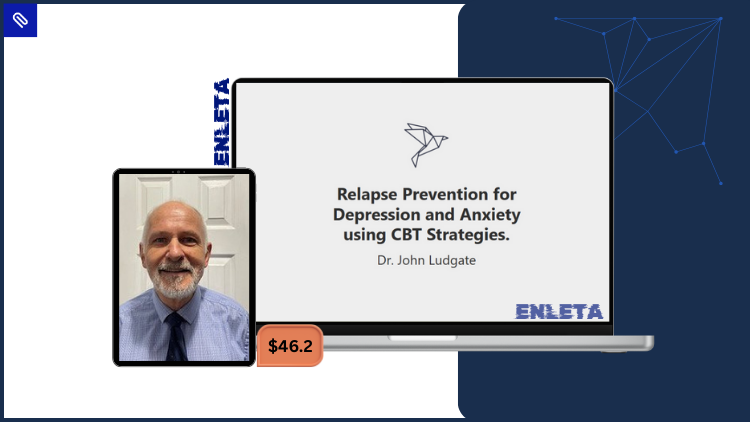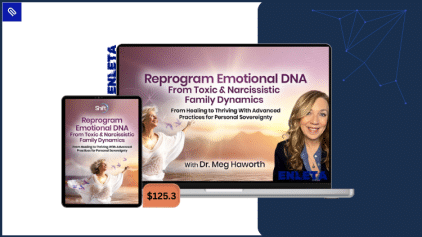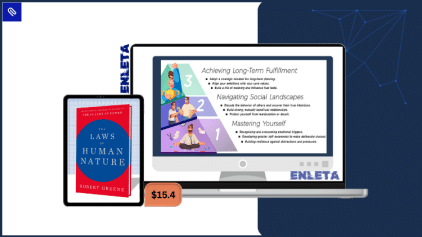Relapse Prevention for Depression and Anxiety using CBT Strategies by Dr. John Ludgate – Instant Download!
Relapse Prevention for Depression and Anxiety Using CBT Strategies is a continuing education workshop by Dr. John Ludgate, designed for clinicians, therapists, and mental health professionals to deepen their ability to predict, prevent, and manage relapse in clients with depression and anxiety.
Relapse Prevention for Depression and Anxiety using CBT Strategies by Dr. John Ludgate Free Download – Includes Verified Content:
Relapse Prevention for Depression and Anxiety using CBT Strategies – Free Download Video Sample:
Relapse Prevention for Depression and Anxiety using CBT Strategies Free Download, Watch content proof here:
PDF Sample – Relapse Prevention for Depression and Anxiety using CBT Strategies , watch here:
Relapse Prevention for Depression and Anxiety using CBT Strategies – Overview of This Course
Relapse Prevention for Depression and Anxiety using CBT Strategies includes 3 hours of certified training, divided into 21 lessons ranging from 5-15 minutes each. Participants gain access to downloadable PowerPoint slides, a bibliography, course handouts, and a certificate of achievement. The workshop provides 4 months of access, automatically extended until completion, ensuring flexibility in learning pace.
Learners will explore factors contributing to relapse, empirical predictors of poor long-term outcome, strategies for maintenance, early warning signs, relapse cycles, and structured plans to sustain therapeutic gains. The format combines evidence-based techniques with clinical examples to help integrate relapse prevention within psychotherapy practice.
Why Should You Choose This Course?
You should choose Relapse Prevention for Depression and Anxiety Using CBT Strategies if you are seeking long-tail professional gains such as “how to reduce relapse risk in clients with recurrent major depressive disorder” or “how to use CBT-based maintenance strategies for anxiety disorders to support sustained recovery.”
Many clinicians are well versed in CBT for acute phases of depression or anxiety but find that relapse is a common event once treatment ends. Standard therapy often lacks a formal plan for preventing relapse, leaving gaps in maintenance, booster sessions, or recognizing early relapse indicators. This course specifically addresses those gaps.
Another reason is the credibility of Dr. John Ludgate. With his training under foundational figures in cognitive therapy and his extensive clinical and supervisory work, he offers techniques grounded in both research and applied practice. This ensures that what you learn isn’t just theoretical but clinically relevant.
Finally, for therapists wanting to incorporate relapse prevention into pre-termination phases, or throughout ongoing therapy, this course gives structured guidance: from estimating relapse risk, creating relapse prevention plans, employing lifestyle modifications, to therapist well-being and mindfulness. These add nuance to your clinical toolbox.
What You’ll Learn
By completing Relapse Prevention for Depression and Anxiety Using CBT Strategies, you will acquire the following competencies:
-
Incidence and Predictors of Relapse
Learn which factors—clinical, psychological, behavioral, and contextual—most reliably signal risk for relapse in both depression and anxiety. -
Risk Estimation & Relapse Prevention Planning
Skills for estimating relapse risk, constructing structured relapse prevention plans, and weaving maintenance strategies throughout therapy. -
CBT-Based Maintenance Techniques
Evidence-based techniques for maintaining therapeutic gains: thought record maintenance, exposure, behavior activation, cognitive restructuring, and modifying lifestyle practices to support mood and anxiety stability. -
Relapse Cycle Analysis
Explore the relapse cycle through examples; recognize early warning signs, triggers, and how to intervene before full relapse occurs. -
Pre-Termination and Booster Sessions
Guidance on what to do in the final phase of therapy: preparing clients for the end of regular sessions, scheduling booster maintenance, and reinforcing relapse prevention skills. -
Lifestyle Modification & Mindfulness
Strategies for integrating mindfulness, health behaviors, and lifestyle changes (sleep, routine, social connection) to buffer against relapse risk. -
Therapist Well-being
Understanding how therapist self-care affects the quality of relapse prevention work and how clinician burnout or stress can indirectly affect client outcomes. -
Clinical Guidelines for Handling Relapse Events
When a client has already relapsed: how to respond clinically, manage symptoms, re-engage work without blame or rupture, and adapt treatment accordingly.
Who Should Take This Course?
This course is appropriate for:
-
Psychologists, psychiatrists, clinical social workers, marriage and family therapists, and counselors working with clients diagnosed with depression or anxiety.
-
Clinicians who already use CBT in their work but wish to strengthen maintenance, relapse prevention, and long-term outcomes.
-
Mental health professionals facing clients who have achieved symptomatic remission but are at high risk of recurrence.
-
Therapists preparing for pre-termination phases who want structured plans to sustain gains post-therapy.
-
Professionals interested in evidence-based methods to handle anxiety and depressive relapse, including early warning signs and prevention strategies.
-
Anyone whose long-term goals include “reducing rates of relapse in anxiety and depression with empirically supported techniques” or “integrating relapse prevention into routine clinical CBT practice.”
Conclusion
Relapse is not an inevitable endpoint in anxiety or depression treatment—it is a challenge amenable to prevention when addressed proactively. Relapse Prevention for Depression and Anxiety Using CBT Strategies provides clinicians with research-based tools, structured maintenance and booster strategies, and clarity on risk factors and relapse cycles. Graduates emerge with long-term capabilities such as “how to predict and intercept relapse before full deterioration”, “how to maintain therapeutic gains through lifestyle and mindfulness supplementation”, and “how to ethically and effectively manage relapse events within CBT frameworks.”
👍Strengthen your clinical effectiveness — enroll in Relapse Prevention for Depression and Anxiety Using CBT Strategies today and equip yourself with tools to ensure long-lasting recovery for your clients.











Reviews
There are no reviews yet.